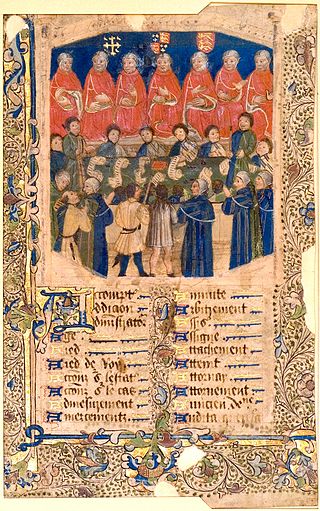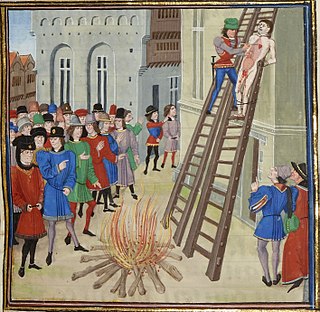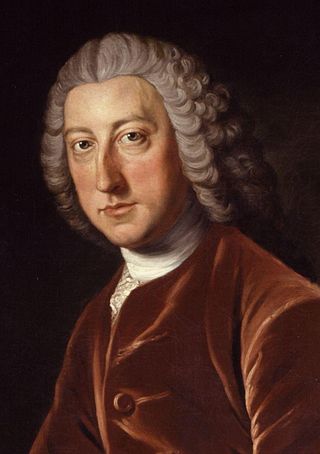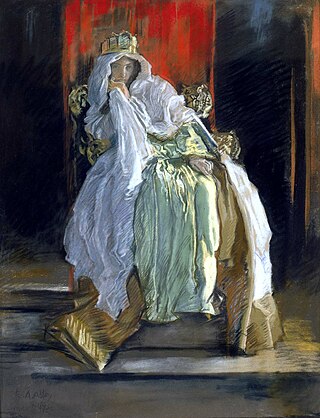Related Research Articles
Singular they, along with its inflected or derivative forms, them, their, theirs, and themselves, is a gender-neutral third-person pronoun. It typically occurs with an indeterminate antecedent, in sentences such as:
Kapellmeister, from German Kapelle (chapel) and Meister (master), literally "master of the chapel choir", designates the leader of an ensemble of musicians. Originally used to refer to somebody in charge of music in a chapel, the term has evolved considerably in its meaning and is today used for denoting the leader of a musical ensemble, often smaller ones used for TV, radio, and theatres.

A jurist is a person with expert knowledge of law; someone who analyzes and comments on law. This person is usually a specialist legal scholar, mostly with a formal qualification in law and often a legal practitioner. In the United Kingdom the term "jurist" is mostly used for legal academics, while in the United States the term may also be applied to a judge. With reference to Roman law, a "jurist" is a jurisconsult (iurisconsultus).

In the field of jurisprudence, equity is the particular body of law, developed in the English Court of Chancery, with the general purpose of providing legal remedies for cases wherein the common law is inflexible and cannot fairly resolve the disputed legal matter. Conceptually, equity was part of the historical origins of the system of common law of England, yet is a field of law separate from common law, because equity has its own unique rules and principles, and was administered by courts of equity.

Nonconformists were Protestant Christians who did not "conform" to the governance and usages of the state church in England, and in Wales until 1914, the Church of England.

Conscience is a cognitive process that elicits emotion and rational associations based on an individual's moral philosophy or value system. Conscience stands in contrast to elicited emotion or thought due to associations based on immediate sensory perceptions and reflexive responses, as in sympathetic central nervous system responses. In common terms, conscience is often described as leading to feelings of remorse when a person commits an act that conflicts with their moral values. The extent to which conscience informs moral judgment before an action and whether such moral judgments are or should be based on reason has occasioned debate through much of modern history between theories of basics in ethic of human life in juxtaposition to the theories of romanticism and other reactionary movements after the end of the Middle Ages.

The Lord Chancellor, formally titled Lord High Chancellor of Great Britain, is the highest-ranking traditional minister among the Great Officers of State in Scotland and England in the United Kingdom, nominally outranking the prime minister. The lord chancellor is appointed by the sovereign on the advice of the prime minister. Prior to the union of England and Scotland into the Kingdom of Great Britain, there were separate lord chancellors for the Kingdom of England and the Kingdom of Scotland. There were Lord Chancellors of Ireland until 1922.
This article contains information about the literary events and publications of 1660.

Admiral Arthur Herbert, 1st Earl of Torrington was an English Royal Navy officer, peer and politician. Dismissed by King James II of England in 1688 for refusing to vote to repeal the Test Act, which prevented Roman Catholics from holding public office, he brought the Invitation to William to William of Orange at The Hague, disguised as a simple sailor. As a reward he was made commander of William's invasion fleet which landed at Torbay in Devon on 5 November 1688, which initiated the Glorious Revolution.

The Broad Bottom ministry was the factional coalition government of Great Britain between 1744 and 1754. It was led by the two Pelham brothers in Parliament, Prime Minister Henry Pelham in the House of Commons and the Duke of Newcastle in the House of Lords.

James VII and II was King of England and Ireland as James II and King of Scotland as James VII from the death of his elder brother, Charles II, on 6 February 1685. He was deposed in the Glorious Revolution of 1688. He was the last Catholic monarch of England, Scotland, and Ireland. His reign is now remembered primarily for conflicts over religious tolerance, but it also involved struggles over the principles of absolutism and the divine right of kings. His deposition ended a century of political and civil strife in England by confirming the primacy of the English Parliament over the Crown.
The Kingdom of Great Britain was governed by a caretaker government in April–June 1757—after the King's dismissal of William Pitt led to the collapse of the Pitt–Devonshire ministry amid the Seven Years' War. William Cavendish, 4th Duke of Devonshire, continued as the nominal head of government.

The Court of Common Pleas, or Common Bench, was a common law court in the English legal system that covered "common pleas"; actions between subject and subject, which did not concern the king. Created in the late 12th to early 13th century after splitting from the Exchequer of Pleas, the Common Pleas served as one of the central English courts for around 600 years. Authorised by Magna Carta to sit in a fixed location, the Common Pleas sat in Westminster Hall for its entire existence, joined by the Exchequer of Pleas and Court of King's Bench.

John Gellibrand Hubbard, 1st Baron Addington PC, was a City of London financier and a Conservative Party politician.
Carura or Karoura was an ancient town of Asia Minor on the north-eastern border of ancient Caria. Its position east of the range of Cadmus assigns it to Phrygia, under which country Strabo describes it. It was on the south side of the Maeander River, 20 miles west of Laodicea to Ephesus. The place is identified by hot springs approximately 12 miles northwest of Denizli, that have been described by the scholars Pococke and Chandler. Strabo observed that Carura contained many inns (πανδοχεῖα), which is explained by the fact of its being on a line of great traffic, by which the wool and other products of the interior were transported to the coast. He added that it has hot springs, some in the Maeander, and some on the banks of the river.

To be hanged, drawn and quartered became a statutory penalty for men convicted of high treason in the Kingdom of England from 1352 under King Edward III (1327–1377), although similar rituals are recorded during the reign of King Henry III (1216–1272). The convicted traitor was fastened to a hurdle, or wooden panel, and drawn by horse to the place of execution, where he was then hanged, emasculated, disembowelled, beheaded, and quartered. His remains would then often be displayed in prominent places across the country, such as London Bridge, to serve as a warning of the fate of traitors. For reasons of public decency, women convicted of high treason were instead burned at the stake.

Between 1757 and 1762, at the height of the Seven Years' War, the Pitt–Newcastle ministry governed the Kingdom of Great Britain. It was headed by Thomas Pelham-Holles, 1st Duke of Newcastle, serving in his second stint as prime minister. The most influential and famous minister, however, was William Pitt the Elder, Secretary of State.

"The lady doth protest too much, methinks" is a line from the play Hamlet by William Shakespeare. It is spoken by Queen Gertrude in response to the insincere overacting of a character in the play within a play created by Prince Hamlet to elicit evidence of his uncle's guilt in the murder of his father, the King of Denmark.

William of Wrotham or William de Wrotham was a medieval English royal administrator and clergyman. Although a late 13th-century source says that William held a royal office under King Henry II of England, the first contemporary reference to William is in 1197, when he became responsible for, among other things, the royal tin mines. He also held ecclesiastical office, eventually becoming Archdeacon of Taunton, and served King John of England as an administrator of ecclesiastical lands and a collector of taxes.
Stephen Cheston was an English lawyer and priest. He was appointed Archdeacon of Winchester under Mary I of England, and retained the position for the rest of his life, despite an attempt to remove him by legal means under Elizabeth I.
References
- ↑ Morris, Martin Ferdinand (1982). An introduction to the history of the development of law. Wm. S. Hein. p. 278. ISBN 978-0-8377-0844-7.
- ↑ Haydn, Joseph (1871). "Keeper of the King's Conscience". Haydn's dictionary of dates: relating to all ages and nations, for universal reference. E. Moxon. p. 415.
- ↑ Garner, Bryan A. (2011). Garner's Dictionary of Legal Usage. Oxford University Press. p. 510. ISBN 978-0-19-538420-8.
- ↑ Burdick, William Livesey (1938). The Principles of Roman Law and Their Relation to Modern Law (2002 reprint ed.). The Lawbook Exchange. p. 79. ISBN 978-1-58477-253-8.